Aburahi Matsuri Festival 油日祭り・奴振り
|
Title   • File Name • File Name   • Date • Date   • Position • Position   |
|
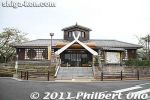
Held only once every five years, the Aburahi Festival with the yakko-furi procession was held by Aburahi Shrine in Koka, Shiga Prefecture, Japan on May 1, 2011.The procession features yakko samurai laborers who carry a trunk and sing. Others also dance. The procession makes a circular route near Aburahi and Koka Stations on the JR Kusatsu Line. Aburahi Station on the JR Kusatsu Line. Very nice design.
|
|

Inside Aburahi Station.
|
|

Rental bicycles at Aburahi Station's waiting room. The round windows have a ninja shuriken throwing knife design.
|
|
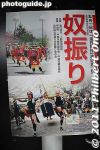
Poster for Aburahi Matsuri in 2011. The Aburahi Matsuri festival ceremony is held every year on May 1, but the colorful yakko-furi procession of over 100 people is held only once every 5 years.
|
|
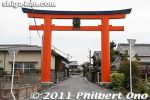
Aburahi Shrine worships Sarutahiko, a god of strength also revered by the samurai. A large torii over the road near the Aburahi Station.
|
|
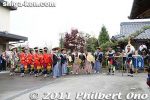
The festival is a procession combined with Shinto ceremonies. The procession was to arrive at Aburahi Shrine at 10:30 am. Before proceeding to the shrine, the group had a pep talk in their neighborhood.
|
|
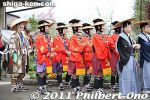
From Aburahi Shrine, the procession takes a circular 9-km route to as far as Koka Station (around 3 pm), then they return via Aburahi Station and Shirahige Shrine before reaching Aburahi Shrine at 6 pm.
|
|

My video of the Aburahi Matsuri. The yakko-furi procession reenacts the samurai coming to worship at the shrine. You have to watch this video to understand the soundless photos.
|
|
|
|
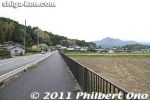
Aburahi Shrine is a 30-min. walk from Aburahi Station. I could've rented a bicycle, but walking was going to be more convenient for me.
|
|
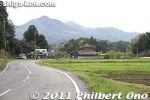
Walking to Aburahi Shrine.
|
|
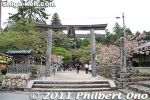
Aburahi Shrine torii. There's a short path leading to the Romon Gate and this is where the yakko procession performs as they proceed to the shrine.
|
|
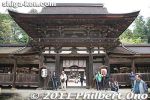
Romon Gate of Aburahi Shrine. MAP
|
|
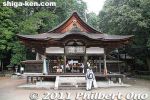
Haiden Hall with two mikoshi portable shrines.
|
|
|
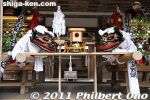
Lion heads.
|
|
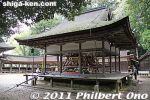
Haiden Hall
|
|
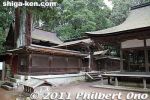
Aburahi Shrine Honden hall on the left. Aburahi Shrine is dedicated to a god named Aburahi Daijin, the god of oil.
|
|
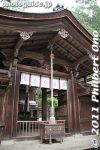
Aburahi Shrine also worships Sarutahiko (猿田彦神) god of strength and resilience and Mizuhanome (罔象女神) goddess of wells. This is the Honden hall.
|
|
|
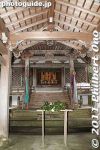
Aburahi Shrine Honden hall.
|
|
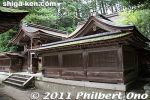
Aburahi Shrine Honden hall.
|
|
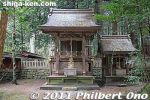
Aburahi Shrine's afiliate shrines.
|
|
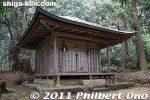
Storehouse.
|
|

About Aburahi Shrine.
|
|
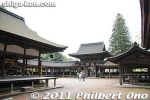
Aburahi Shrine was where the Koka ninja gathered and held important meetings.
|
|
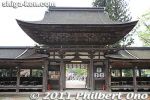
Back of the Romon Gate.
|
|
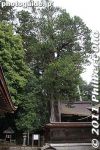
35 meter-high tree, about 750 years old next to the Honden hall.
|
|

About the old tree.
|
|
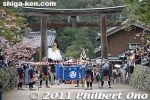
The procession's yakko-furi (medieval marching dancers) consists of three units. This first unit is the Nagamochi-yakko who are coolies carrying a long crate. They mimick the laborers who carried luggage for traveling samurai contingents.
|
|
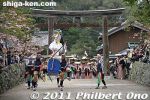
The Nagamochi yakko (luggage coolies) group arrive at the shrine. 長持奴
|
|
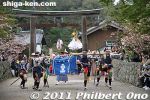
The Nagamochi-yakko sing a humorous song as they carry the long crate in very stylized strides. Every so often, they stop and sing. 長持奴
|
|
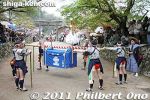
The crate is carried by two men in the front and one man in the back.
|
|
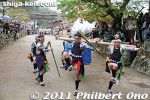
長持奴
|
|
|
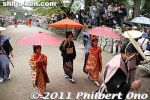
Two chigo girls and a court lady. 女房と稚児
|
|
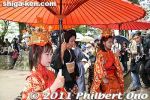
Two chigo girls and a court lady. 女房と稚児
|
|

The second yakko-furi unit are the Hasami-bako yakko bearers who carry a square box. They too sing and dance. 挟箱奴
|
|
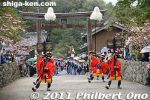
挟箱奴
|
|
|
|
|
|
|
|
|
|
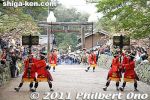
Hasami-bako yakko box bearers change hands as they pass on the box to the other.
|
|
|
|
|
|
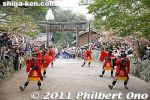
Behind the four Hasami-bako yakko box bearers are the Keyari-yakko who are two men carrying fur-tipped spears. 毛槍奴
|
|
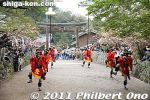
They slowly make their way to the shrine as they perform their song and dance.
|
|
|
|
|
|
|
|
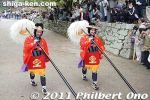
Keyari-yakko carrying fur-tipped spears enter the Romon Gate. 毛槍奴
|
|
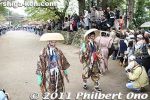
The yakko-furi are followed by low-ranking samurai called Okado (or Kachi). 徒士
|
|
|
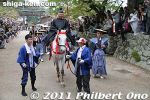
The priest on horseback arrives at Aburahi Shrine. 頭殿
|
|
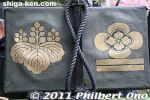
Crests on the hasami-bako chests.
|
|
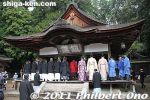
After everyone arrives at the shrine, they hold a Shinto ceremony.
|
|
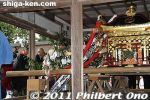
Shinto ceremony. 宮立ち
|
|
|
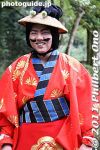
During the Shinto ceremony, the rest of the procession take a break.
|
|
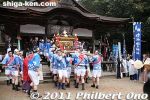
At around 11:30 am, the two mikoshi portable shrines leave the shrine.
|
|
|
|

They carried the mikoshi around a few times.
|
|
|
|
|
|
|
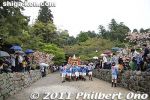
Leaving the shrine. The procession is headed by the two mikoshi.
|
|
|
|
|
|
|
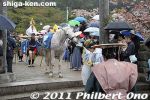
The procession includes the Sacred Horse. 神馬
|
|
|
|
|
|
|
|
|
|
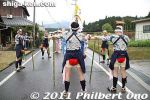
The procession proceeds across town on a 9 km circular route bringing them back to Aburahi Shrine in the late afternoon. They head for the Otabisho rest place.
|
|
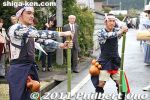
Every few minutes, the Nagamochi yakko-furi unit stops and sings the song as people in the neighborhood come out and watch.
|
|
|
|
|
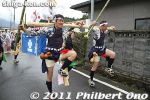
They repeat the same thing over and over. The hasami-bako yakko-furi unit dressed in red do not perform enroute. Apparently, they perform only at the major rest stops like at the shrine and Otabisho.
|
|
|
|
|
|
|
|
|
|
|
|
|
|
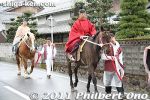
Shrine priest on horseback.
|
|
|
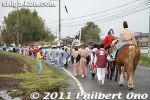
The procession incudes a group of shrine officials and shrine priests on horseback. They follow a rural route.
|
|
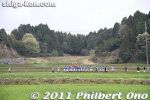
I declined to follow them all day long since their performance is repetitive. I spent the rest of the time renting a bicycle and Aburahi Station and saw other sights in the area.
|
|
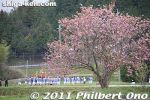
The next time the Aburahi Matsuri with yakko-furi procession will be held will be in 2021.
|
|
|
|
|
|
|